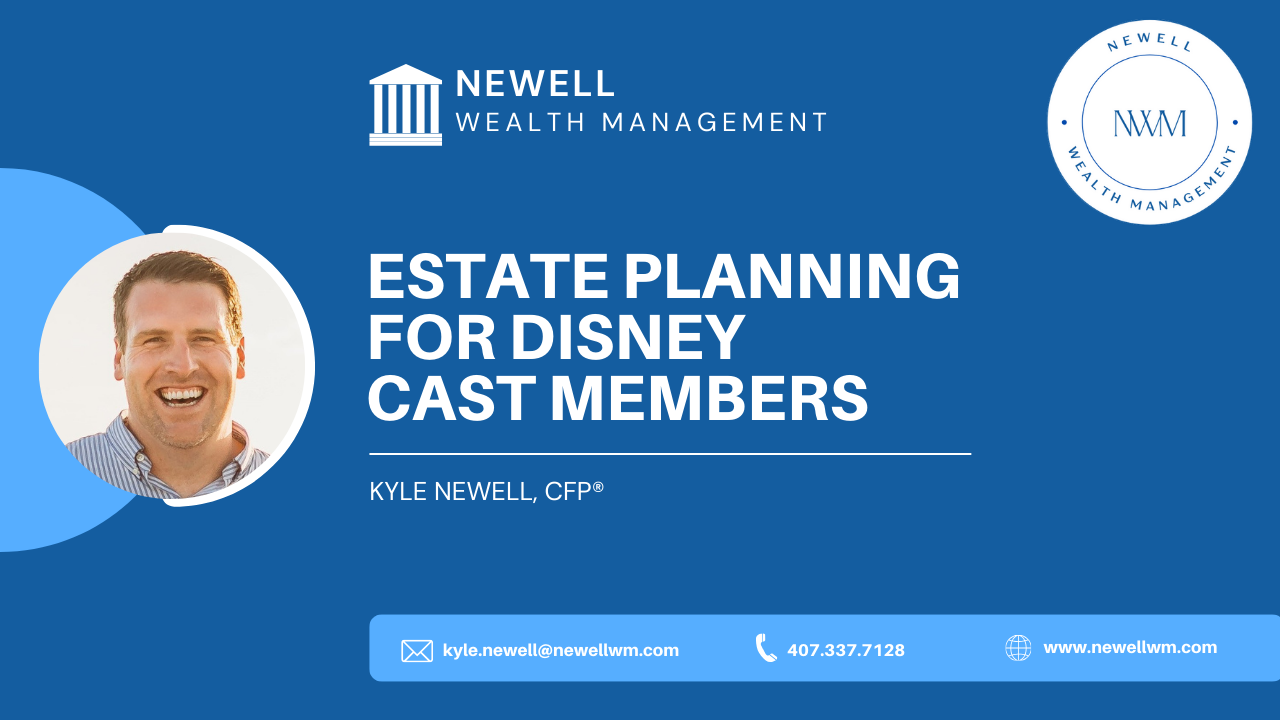Five Estate Planning Steps for Disney Cast Members

As a Disney cast member, you carry on the legacy that Walt created with every guest who comes through the gates. Your dedication is what makes The Walt Disney Company a success. Like Walt, you also have a legacy.
An estate plan is an essential element of your legacy. Let’s discuss some practical estate planning steps, strategies, and insights tailored to you.

Estate Planning Components
There are a lot of components to estate planning to think about, including:
- What are the plans?
- What are the steps?
- What are the documents?
If you were to become incapacitated or pass away, an estate plan helps to ensure that whatever your wishes are during that time are followed through with. There are five things that Disney cast members should think about when it comes to estate planning.
1) Have the proper documents.
Your estate plan may not work as you intended without the correct documents. There are many different types of documents, each a different tool with a specific purpose, so you want to ensure you have the right ones for your situation.
Thankfully, Disney does have a benefit called the Legal Plan Benefit. You can subscribe during open enrollment and have access to an attorney to put together the proper documents.
The Disney Legal Plan covers several estate planning documents. Let’s take a look at each in more detail.
Trust
A trust is its own entity. Most people set up a living or revocable trust, which means they can change it while they’re alive. Many people think you need to be a millionaire or more to have a trust, but that’s not the case.
A trust is a tool that’s designed to avoid the probate process. You can add it to things like your
- Bank accounts
- Life insurance
- Retirement Accounts
- Your home
There are some tax consequences to consider when we’re talking about trusts, but from an estate planning standpoint, a trust can avoid the probate process, just like a beneficiary designation can.
Will
A will tells the state your wishes or your will upon passing. Who gets what? How do you want to divide it up? Do you want it all to go to your spouse, or do you want it to go to the kids equally? A charity? A combination of it all?
One difference between a trust and a will is that a will does not avoid the probate process. People often think, “I’ve got a will, so it won’t go through probate.” That’s not the case. A will has to go through the probate court.
Probate is an extended process, at least in the state of Florida. It can last several months to several years, depending on if the will is contested. The probate process can lengthen the time it takes for beneficiaries to receive benefits.
Healthcare Surrogate
Also known as a Healthcare Power of Attorney, this document allows someone to make healthcare decisions on your behalf should you become incapacitated. Let’s say you were in surgery last week, and during that time, the doctors needed to make some decisions.
Using the Healthcare Surrogate document allows you to assign someone to talk to the doctors and make decisions on your behalf before something happens or if you cannot speak for yourself.
Durable Power of Attorney
A durable power of attorney can make financial decisions on behalf of somebody else. Many times, husbands and wives think, “Well, we’re married, so my spouse can make decisions for me.” It’s critical to know that this is not the case. For financial institutions to act on your behalf, you must have a durable power of attorney.
If you have a jointly held account, you can work on behalf of one another. However, if it’s a retirement account, such as the Disney 401k, Disney SIP, or Disney Retirement Plan, you will need a durable power of attorney for Fidelity to talk to your designated person.
Living Will
The famous Terry Schiavo case in Florida revolved around a debate about how long to keep Terry Schiavo alive. Terry’s husband and her parents battled it out while she was in a coma. A living will allows you to determine that for yourself beforehand so that your wishes are fulfilled rather than having family fight over how long to keep you alive if you’re in some sort of coma or vegetative state.
These are the most common estate planning documents. Work with your attorney to determine which ones you need and get them created.
2) Implement the documents.
Creating the documents is just the start of the process. Once you have those documents put together, you must follow through with them. Often, people have the documents but haven’t implemented them, whether by appropriately naming beneficiaries, changing account titles, changing house titles, etc.
Attorneys will often give you a letter of instruction, a funding letter, or something similar. This letter basically states that you have a particular document in place, so you can now take the documents and put them into action with your assets.
Putting them into action includes changing beneficiaries and getting your durable power of attorney to your financial institution so they can add the person now rather than waiting until there is a crisis and your spouse is trying to act on those accounts.
Example
Perhaps you have a trust and want to make it the primary beneficiary of your bank account because the money will go to your kids. If your kids aren’t there, then it will go to the grandkids, and so on. Remember, trusts are designed to avoid the probate process.
If you just name your kids as the beneficiary, they will inherit the money if they are alive. What if God forbid, you got into an accident and they weren’t alive? What’s the next step for the money? If the next step isn’t clearly written out with a designated beneficiary form, it could go to probate.
Many people create a trust but never go through and change the beneficiaries to the trust or change the house title or account names. It’s essential to work with an attorney on what to do. There are also potential tax consequences, so you should also talk with your tax advisor.
3) Capture the day-to-day items.
These things may not necessarily be included in the documents we’ve discussed but are just as important. Capture all of the little things in your day-to-day life so that if you pass away or become incapacitated, the person tasked with fulfilling your wishes can do so.
I could write a list of things to include that’s several pages long, but here are a few to get you started.
- Social Media Accounts
- Calendar
- Account Passwords
- Bank Information (including credit cards)
Challenge or Security questions are often overlooked. These are the questions you use when setting up accounts in case you forget the password. What street did you grow up on? Who was your best friend? What was your first pet’s name? Having these answers can help those handling your affairs.
Who are your trusted advisors? These can include your pastor, doctors, attorneys, financial advisors, tax advisor, etc. Including their names and contact numbers is critical to helping facilitate the process.
Practice Runs
Typically, one person is aware of all the financial stuff with married couples, and the other isn’t. In a time of stress, the one who isn’t may have a hard time recalling all of this information. Having it written down is a good practice.
If you’re married to someone who’s not inclined to deal with financial matters and details, I suggest having some practice runs. Spend some time with them. Show them what’s happening and have them do some things to be prepared if something happens to you.
It’s super stressful for somebody who doesn’t deal with it every day and has now lost their partner, or their partner is incapacitated, to try and step in to fulfill those roles. Preparing them now can be a gift to them later should they be in this situation.
4) Determine the people.
Who will be involved with handling your affairs or your estate plan? Who will back them up if they cannot fulfill their duties? It’s essential to consider what that looks like now and 10, 20, 30, 40, and 50 years from now.
5) Coordinate your estate plan with Disney.
As a Disney cast member, it’s imperative that you coordinate your estate plan with Disney. This will include things like your
- Fidelity 401k or Savings Investment Plan (SIP)
- Retirement Savings Plan (for non-pension cast) (DRSP)
- Pension (for pension cast)
- Company provided life insurance
- Non-qualified Deferred Compensation Plan (NQDC)
There are many different types of accounts. You want to ensure that your estate plans are listed appropriately on each one.
The Disney 401k plan or Disney SIP can have primary and contingent beneficiaries. Attorneys often recommend having your spouse as the primary beneficiary and your adult children if you have them or a trust as the contingent beneficiary.
If you have younger children, consider having a trust. While there’s some debate about whether a trust should be listed as a beneficiary, the key is having it structured appropriately to handle the tax distributions from it.
There’s also the Disney Retirement Savings Plan (DRSP). That, too, can have primary and contingent beneficiaries. You can have several listed in each category if you want.
Disney LTI is unique because you can only list primary beneficiaries. They do not accept contingent beneficiaries. This is one case where it makes sense to have a trust listed as the primary beneficiary rather than your spouse to have a contingency plan if you and your spouse pass away simultaneously because a trust will avoid the probate process on the asset.
Ensure that you also have a beneficiary on the Merrill Edge individual account that the company opens up for you to be able to accept your LTI.
The Health Savings Account and flexible spending accounts through Disney are often overlooked when naming beneficiaries.
If you are a cast member with a pension, your spouse is entitled to your pension when you pass away. Verify that Disney knows you’re married and has your spouse listed on your pension to avoid any problems with your pension income if the worst should happen.
Let’s Review
As you can see, the Walt Disney Company’s benefits package has many components, and it is important to make sure your estate plan is lined up appropriately with the proper documents. Good estate planning is critical to leaving a legacy for your family and helping alleviate some stress during what will inevitably be a difficult time.
Use these five steps to create an estate plan that will carry your legacy for generations to come.
- Have the proper documents.
- Implement the documents.
- Capture the day-to-day items.
- Determine the people.
- Coordinate your estate plan with Disney.
If you would like guidance from an experienced financial planner who is well-versed with Disney benefits, I’m happy to help.
We can meet virtually or in person if you live in the Central Florida area. Please email me at kyle.newell@newellwm.com, call/text at 407.337.7128, or schedule a meeting at Schedule – Newell Wealth Management (newellwm.com)
Important Information
Newell Wealth Management, LLC (“NWM”) is a registered investment advisor offering advisory services in the State of FL and in other jurisdictions where exempted. Registration does not imply a certain level of skill or training. The presence of this website on the Internet shall not be directly or indirectly interpreted as a solicitation of investment advisory services to persons of another jurisdiction unless otherwise permitted by statute. Follow-up or individualized responses to consumers in a particular state by NWM in the rendering of personalized investment advice for compensation shall not be made without our first complying with jurisdiction requirements or pursuant an applicable state exemption.
All written content on this site is for information purposes only and is not intended to provide specific advice or recommendations for any individual. Opinions expressed herein are solely those of NWM, unless otherwise specifically cited. Kyle Newell and NWM are neither an attorney nor an accountant, and no portion of this website content should be interpreted as legal, accounting or tax advice. Material presented is believed to be from reliable sources and no representations are made by our firm as to other parties’ informational accuracy or completeness. There is no assurance that the views or strategies discussed are suitable for all investors or will yield positive outcomes. Investment involves risks including possible loss of principal and unless otherwise stated, are not guaranteed. Any economic forecasts set forth may not develop as predicted and are subject to change. All information or ideas provided should be discussed in detail with an advisor, accountant or legal counsel prior to implementation.
